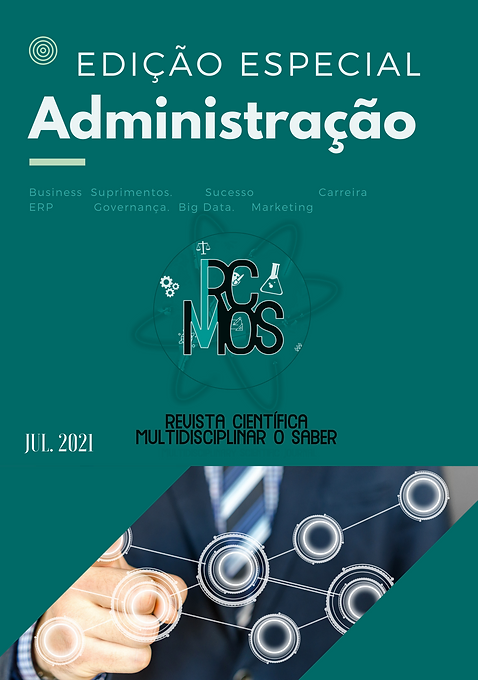THE IMPORTANCE OF BUSINESS INTELLIGENCE IN THE DECISION-MAKING PROCESS OF COMPANY X IN PINHALZINHO-SC
DOI:
https://doi.org/10.51473/rcmos.v1i1.2021.661Keywords:
Change; Busines Intelligence (BI); Strategy; Decision Making.Abstract
Over the years, companies are going through various organizational change processes, many transformations are taking place, and one of them is the insertion of technologies in the most diverse business segments. Information technology and business intelligence, Busines Intligence (BI), is becoming loyal and a great ally when it comes to strategy and decision making. Organizations are using such technologies as a support tool in the way they administer and manage their processes and businesses. These tools assist in the analysis of data and results that companies have, providing safer and more assertive decision making, in addition to offering greater security to owners. This study seeks to analyze the importance of this theme in the organizational environment of company X, located in the municipality of Pinhalzinho-SC. The data for this article were collected through an interview with the owners of the organization. In addition to doing an analysis on the subject, one of the objectives of this work is to present an improvement proposal for the company.
Downloads
References
CHIAVENATO, I.; SAPIRO, A. Planejamento Estratégico: fundamentos e aplicações.1. ed. 13. tiragem. Rio de Janeiro: Elsevier. 2003.
COELHO, R.C. Estado, Governo e Mercado. (2009). Florianópolis = Departamento de Ciências da Administração/ UFSC; [Brasília]: Capes: UAB.
DEITEL, H.; DEITEL P. J. (2004). E-business e e-commerce para administradores. São Paulo: Person Education do Brasil.
v. 7 ed. especial (2021): RCMOS - Revista Científica Multidisciplinar O Saber. ISSN: 2675-9128
MARTINS, Leandro. (2006). Marketing: Como se tornar um profissional de sucesso. 1. ed. São Paulo: Digerati Books.
MINTZBERG, HENRY; LAMPEL, JOSEPH; QUINN, JAMES BRIAN; GROSHAL, SUMANTRA. (2007). O processo da estratégia [recurso eletrônico]: conceitos, contextos e casos selecionados. Tradução Luciana de Oliveira da Rocha. Dados eletrônicos. Porto Alegre: Artmed.
OLIVEIRA, D. de P. R. Planejamento estratégico: conceitos, metodologia e práticas. São Paulo. 2007.
OLIVEIRA, D. de P. R. (2014). Estratégia Empresarial; Vantagem Competitiva: como estabelecer, implementar e avaliar. 9. ed. São Paulo: Editora Atlas.
PADOVEZE, C. L. (2003). Controladoria estratégica e operacional: Conceitos, Estrutura, Aplicação. Pioneira Thomson Learnig. São Paulo.
PENNA, R. A. C., REIS JUNIOR, A. S. DOS. (2003). O Data Warehouse como Suporte à Inteligência de Negócio. VI SIMPOI – Simpósio de Administração da Produção, Logística e Operações Internacionais. São Paulo.
PORTER, M. E. (1999). Competição= On competition: estratégias competitivas essenciais. Rio de Janeiro; Elsevier, 13ª reimpressão.
SANTOS, M. Y., RAMOS, I.; Business Intelligence. Tecnologias da Informação na Gestão do Conhecimento. Editora FCA 2. ed., 2009.
Tavares, Mauro Calixta. (2008). Gestão Estratégica. 2. ed. 4. reimp. São Paulo: Atlas.
TURBAN, E., SHARDA, R; DELEN, D. (2010). Decision Support and Business Inteligence Systems. Prentice Hall 9 edition.
TURCHI, S. Estratégias de Marketing Digital e e-commerce. São Paulo: Atlas. 2012.
ZILBER, S. N. Fatores Críticos para o Desempenho e Implantação de E-business por Empresas Tradicionais. Tese (Doutorado em Administração). Faculdade de Economia, Administração e Contabilidade da Universidade de São Paulo, São Paulo. 2002
Downloads
Published
Issue
Section
License
Copyright (c) 2024 Karima Kurtz Colvero Kin, Hugo Silva Ferreira (Autor/in)

This work is licensed under a Creative Commons Attribution 4.0 International License.












